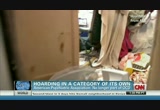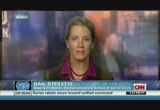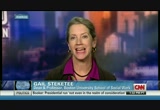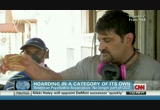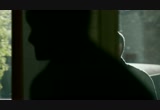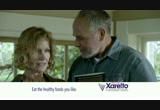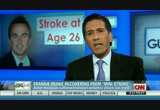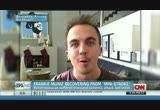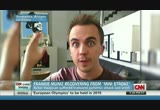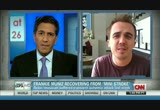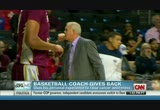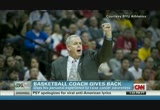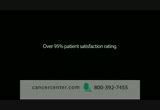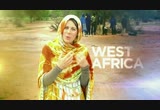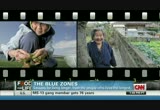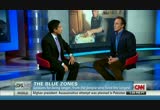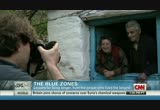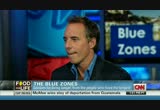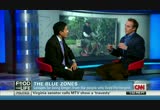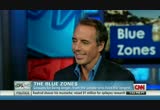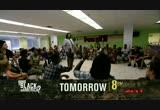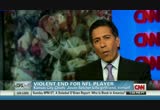tv Sanjay Gupta MD CNN December 8, 2012 1:30pm-2:00pm PST
1:30 pm
issue of hoarding. this problem is now considered a specific mental illness, sanjay gupta starts right now. hey, there is thank you for joining us, actor frankie muniz is here, just had a mini-stroke, he is only twenty-seven years old. first, consider this, hoarding as a mental illness under the microscope. you know that the medical world is buzzing about the new diagnosis and the specific manual of disorders. dsm, the first overhaul in twenty years, the so-called
1:31 pm
bible of mental illness, it defines what is and what is not a mental illness. i can't underscore enough what a big deal this is. they just changed issues based on the latest research. so i want to give you example of something you may have not heard of, or thought about. hoarding. it now has a category of its own. >> if my mother is unable to clean up the house, i don't know what will happen. we are doing this as a last ditch effort. she has hit rock bottom. >> she is the dean and a professor at the boston school of socialwork and has written extensively on hoarding, thank you for joining us, appreciate it. >> glad to. >> you know, we all collect stuff. it is the first thing i sort of thought of when i was reading about this. what constitutes diagnosis
1:32 pm
compulsive hoarding. >> one of the hall marks is difficulty discarding, another mark is what results from this when people try to deal with a pile of things they have accumulated. and of course, that has to cause impairment or distress, in order to qualify for a hoarding disorder. >> so when you talk about the difference between a hoarder, a collector, somebody who is just disorganized. which a lot of people are raising their hands, it has to do with impairment in their life? >> absolutely, somebody who collects things is trying to collect an interesting array that represents a category of objects. so they take a lot of care to pick out one or two things that is specific to filling the gaps in the collection. but it doesn't cause them distress, they enjoy it. and they talk about it with other people and it is a valuable set of objects, but hoarding is very different.
1:33 pm
>> the big news here seems to be that hoarding no longer seems to be a part of ocd. which is interesting, your co-author, randy frost says that some aspects don't fit the description of the hoarding pattern. he describes it as people going into a dissociative state, where they forget they don't have enough money or space to obtain the things they're obtaining. >> that is true, people who have a hoarding problem collect, and when they collect they get excited about what they're doing. it kind of looks like a high. it is something we don't see in the other. the worst thing you can do is cleaning out their home, why is that? >> it is because, well imagine if somebody came into your home and took away all the stuff without you having any say about it, of course you would be very upset. people who hoard are very
1:34 pm
attached to their objects, and from their point of view, these are valuable things, or at least things that they want the possibility of going through before they let go of them. so it is very upsetting to someone. >> so how does somebody get help? either from a friend or family, what are they to do in a situation like this? >> the best thing they can do is learn something about hoarding. which i recommend going on the website, oc-foundation.org, and taking a good look at the hoarding section. because it is important to understand why people save what they save. and what it means to them. and then after that, they can try to be of assistance in terms of finding help for the person. >> it is amazing, you know, again, just this update in looking at the way we look at mental illness, it is fascinating, we wanted to give this example, thank you so much for joining us. we appreciate it. >> you're welcome. coming up, he just had a stroke. he is in his mid-twenties.
quote
1:35 pm
actor frankie muniz is here to talk. [ male announcer ] this is bob, a regular guy with an irregular heartbeat. the usual, bob? not today. [ male announcer ] bob has afib: atrial fibrillation not caused by a heart valve problem, a condition that pu him at greater risk for a stroke. [ gps ] turn left. i don't think so. [ male announcer ] for years, bob took warfarin, and made a monthly trip to the clinic to get
1:36 pm
not caused by a heart valve problem, that doesn't require routine blood monitoring. like warfarin, xarelto® is proven effective to reduce the risk of an afib-related stroke. there is limited data on how these drugs compare when warfarin is well managed. no routine blood monitoring means bob can spend his extra time however he likes. new zealand! xarelto® is just one pill a day, taken with the evening meal. and with no dietary restrictions, bob can eat the healthy foods he likes. do not stop taking xarelto® rivaroxaban without talking to the doctor who prescribes it for you. stopping may increase your risk of having a stroke. get medical help right away if you develop any signs or symptoms of bleeding, like unusual bruising or tingling. you may have a higher risk of bleeding if
1:37 pm
and it may take longer for bleeding to stop. tell your doctors you are taking xarelto® before any planned medical or dental procedures. before starting xarelto®, tell your doctor about any conditions, such as kidney, liver or bleeding problems. ready to change your routine? ask your doctor about once-a-day xarelto®. for more information including cost support options, call 1-888-xarelto or visit goxarelto.com.
1:38 pm
ga . you know it seems as if we've seen frankie muniz grow up before our eyes, as malcolm. but this week we got something unexpected from him. he tweeted about a major health scare, saying i was in the hospital, i suffered a mini-stroke, which is not fun at all. i need to start taking care of my body, getting odd. he is twenty-six, this week he turned twenty-seven, he joined us by skype. first things first, happy
1:39 pm
birthday. how are you feeling? >> i feel pretty good. i mean, i -- i don't know how to explain it other than i have forced myself to calm down, to relax. it is not in me to do that. my entire life, i have been non-stop, running around like a crazy person, doing this, worrying about that. so this week i have been really just trying to relax. and i'm still a fair bit lethargic since the whole incident happened. but i'm happy that i'm all right, and -- >> a lot of people are certainly happy that you're doing okay. you may know, frankie, this is my area of expertise, i'm a neurosurgeon, i hope this is helpful. you were told that you suffered a mini-stroke by your doctor, that means the blood temporarily stops going to the brain.
1:40 pm
and people will experience stroke-like symptoms for no more than 24 hours. can you tell me specifically what happened to you? >> i worked out last friday, felt fine, felt normal and great. decided to go on a motorcycle ride. got on my bike, maybe a mile from my house, and started to realize my vision in my right eye was bothering me. i thought there was something on the vizer, realized there was something in my eyes, by the time i got further i lost all of my vision, and started losing my balance, feeling really, really uncomfortable. and couldn't you know, pinpoint why. you know, i had never felt that before. i never had an experience like that. so i didn't know what i was going through. >> you know a lot of people are going to wonder, there is obviously risk factors, hyper tension, and cholesterol, why do the doctors think you had this?
1:41 pm
>> well, i'm still going through the process and more tests, trying to figure it out. from the emergency room they diagnosed me with a tia, mini-stroke, recommended surgeons for me to go see. you know i'm trying to figure it out. because you know, all the things where the people are usually at higher risk for having the tia. like i don't really fit in the categories, you know, as far as age. i mean, i am considered very healthy. i never drank, or smoked cigarettes, never been near a drug. you know what i mean? and i take a lot of pride in that. so you know, all of those things, i'm 125 pounds. i run three miles a day. i lift weights. i do everything i can to live a life -- a healthy life-style. but you know, it definitely is a wake-up call. like you know -- when you're young, when it is you, you feel like you are invincible, almost,
1:42 pm
you hear about all of these things that people can have and things that happen. even car accidents, when it is yourself, i mean me, i feel invincible. but now it makes me go, oh wait. this is my body. i need to take care of it. i need to do whatever i can to stay healthy. i want to live to be a very you know, old man. and you know, hopefully this is not a sign of things to come. you know, and hopefully i can -- you know, get on top of it now and whatever -- find out what it is, and i won't have it again. >> yeah, and we all hope that. but i think what you're saying again is very important. people sometimes need a little brush with a health problem of some sort. and nobody wishes that on anybody, but to the extent that people are hearing your story and it makes them do a better job of checking themselves out. i think it is really important. frankie, i'm a big fan, i'm so glad to meet you over the
1:43 pm
satellite here, and i'm glad you're doing well. >> thank you so much, thanks for having me, i appreciate it. now, byu men's basketball coach, dave rose, has been involved with this group called" coaches versus cancer," and this week decided to take his team to the tournament after fighting his own battle. and counts himself a survivor. >> reporter: this year for the first time, dave rose got to take his byu basketball team to the coaches versus cancer classic tournament. but what made it all the more poignant was his battle with cancer, that he started three years ago. >> we're going to do something to start to raise awareness, and help find a cure. it is personal to me. i understand how these people feel. >> his symptoms came on suddenly, on an early, in fact, returning from a family vacation. >> i got very sick, i was light-headed. i couldn't even sit up.
1:44 pm
so they laid me down, moved some of the passengers and brought oxygen. and cleared the plane, and then brought the medics on. and carted me off the plane and took me to the hospital. i had ten units of blood, and they found the mass and went in and removed it and told me i had cancer. >> doctors removed the tumor from rose's pancreas along with his spleen, they also found a blood clot, removed during surgery. he was back on court and took the team to the tournament, led the cougars to the win, the first in 30 years. >> i feel like i have been given a second chance. there was a real possibility that my time here was going to be numbered. and now i feel like everything i get to do is really just a blessing for me. >> go, go. >> and i'll tell you, it is that message of appreciation for life that rose is looking now to drive home to his own players
1:45 pm
and to his own family every day. and coming up, we have a man who discovered these healthy hot spots. he calls them blue zones, they are places where people live the longest, he decided to stop by and show the formula with all of us. [ woman ] ring. ring. progresso. in what world do potatoes, bacon and cheese add up to 100 calories? your world. ♪ [ whispers ] real bacon... creamy cheese... 100 calories... [ chef ] ma'am [ male announcer ] progresso. you gotta taste this soup.
1:46 pm
1:47 pm
anne's tablet was chatting with a tablet in sydney... a desktop in zurich... and a telepresence room in brazil. the secure cloud helped us get some numbers from my assistant's pc in new york. and before i reached the top, the board meeting became a congrats we sold the company party. wait til my wife's phone hears about this. [ cellphone vibrating ] [ female announcer ] with cisco at the center, working together has never worked so well.
1:49 pm
. you know, everywhere you turn these days there are arsons and books -- articles and books promising ways to extend life, but as my next guest explains, he is the author of the blue zones, nine lessons for living longer from the people who live the longest. dan buetner has spent the last ten years traveling the globe, to find hot spots that he called blue zones, sardinia, italy, loma linda, california, these are all places where people are not only living longer than most americans but their quality of life and overall health is remarkably better, as well. here is his latest blue zone discovery. icaria, greece, here, people are more likely to reach their
1:50 pm
nineties, and older people have a third less chance of getting cancer. their minds are sharp, as well. compared to the united states, icaria has one quarter the rate of dementia. he wants to capture the formula so you and i can live longer. >> you know it captures the imagination, dan, for sure, welcome back to the show. >> a delight to be here. >> people always ask about this, they want to know what other people in other parts of the world know, let me start with the question, how much is genes, life-style? >> 80% is life-style and environment, which i think is really the important part. >> the thing that people point to here in the united states is stress. and it is a vague term, and means different things to different people. is -- stress here in the united states, obviously, we know what it is like. what is it like in other places?
1:51 pm
is there less stress, did you find for example in icaria? >> yes, you tell people you find this blue zone in the middle of of the mediterranean, and people say yeah, if i live in a place like that, i wouldn't have stress. but the reality is they have worries about kids, finances and healths. but what they have that we don't have are daily rituals to shed that stress, in some blue zones, it is simply prayer, other areas, what their families do. in other places, taking a nap. we know that people that take a nap at least five days a week have a third less heart disease problem than people that don't take a nap. it is 15 days to unwind the stress. >> i would love to be able to do that. >> it is hard, but there are things you mentioned, as well. i found it fascinating. this idea in investing in your
1:52 pm
friends, what did you mean by that? >> there are two important aspects, we know the happiest people in america are interacting face to face, six hours a day. so we evolved to be interactive creatures, so the health behaviors are as infectious as catching a cold or the flu, so you look at the blue zones. they were not on diets. the people were not in exercise programs but they were either pro actively, or they were born into a group of people that supported the right habits. >> do people take care of each other more so and encourage each other to eat better or go to the doctor? what is it about that interaction that is so preventible or helpful? >> so we live in a culture that doesn't promise friends. if you meet that definition in america, you have fewer than one friend who cares about you on a bad day, you can live eight
1:53 pm
years less. people in okinawa, and people are in situations where they commit to each other. if things go well, they share the wealth. if they go poory, they share. the women get together, drink sake, talk together, and talk about the village and who the hot guy was back in 1940. they argue like the old friends that they are. the point is, they have that friendship. >> not only if they get sick, somebody will watch for them. psychologically, they know that somebody has their back. that is really important. >> you know, we live in the siloed off world, you're right, not as communal as it was in years past. >> and three years ago, they had more friends, we're now down to
1:54 pm
about 1.5 friends. we're imploding into our houses, watching a lot of tv, not good tv like this here. but this should be a uniform prescription that doctors give patients, socially interact, we know that volunteers have lower rates of heart disease and lower health care costs. >> i love these, everybody at home is counting their friends, who are these one and a half friends? well, it is a joy to have you on the show, great to have you, maybe that will make others happier as well. and we'll check on the top stories minutes away. but something we may all learn from the recent tragedy with the nfl player in kansas city. [ nyquil bottle ] you know i relieve coughs, sneezing, fevers...
1:55 pm
1:58 pm
1:59 pm
kansas city chief's roster, but made his mark, played every game since 2009 and was the starting linebacker. and won over teams and fans. and then you probably know, last week shocking events, he killed his girlfriend and drove to the chief's practice facility and took his own life. that left the teammates and coaches asking why. there were many reports that the couple the fought, and links to head trauma, maybe. there was speculation on the reason, but i wanted you to hear what brady quinn had to say. >> you know, i thought what could i have done different, when you ask somebody how are you doing? when you ask them, what happened, are you telling the truth? we live in a society of social networks and twitter and facebook. and that is fine, and
200 Views
Uploaded by TV Archive on

 Live Music Archive
Live Music Archive Librivox Free Audio
Librivox Free Audio Metropolitan Museum
Metropolitan Museum Cleveland Museum of Art
Cleveland Museum of Art Internet Arcade
Internet Arcade Console Living Room
Console Living Room Books to Borrow
Books to Borrow Open Library
Open Library TV News
TV News Understanding 9/11
Understanding 9/11
